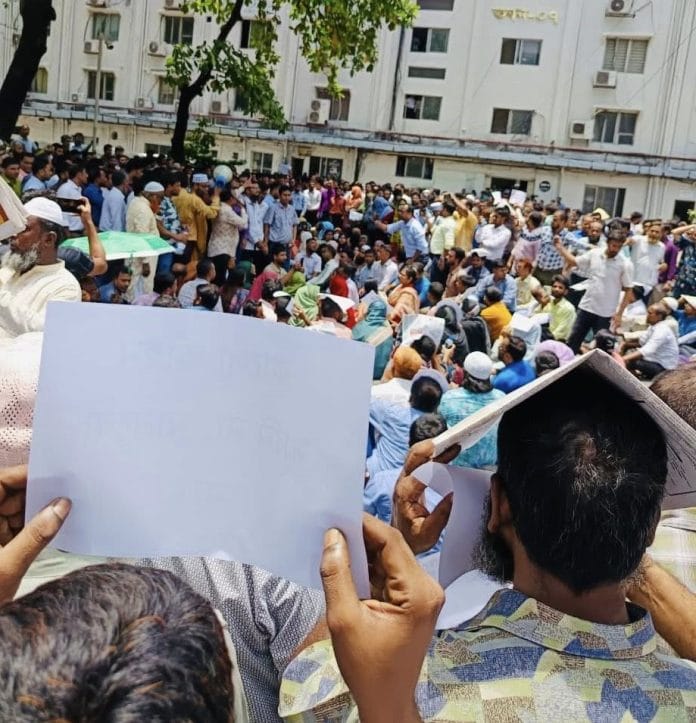Amid intensifying protests at the Bangladesh Secretariat against the newly enacted Public Service (Amendment) Ordinance, 2025, government employees have decided to suspend their movement for one day following assurances that their demands will be communicated directly to the Cabinet Secretary.
On Sunday night, the government issued the ordinance allowing dismissal of public servants for administrative disruptions within 14 days and without departmental proceedings.
It sparked an unrest among civil servants from multiple ministries and departments over what they describe as a “repressive” and “unconstitutional” ordinance.
A gazette notification was also issued hours after employees protested the move at the Secretariat, four days after the advisory council approved its draft.
On Tuesday afternoon, a delegation of secretaries, including Senior Secretary of the Land Ministry ASM Saleh Ahmed, held a meeting with the leaders of the agitating employees.
Speaking to reporters after the meeting, Saleh Ahmed stated that the Cabinet Secretary had assigned a group of secretaries, including himself, to listen to the grievances of the protesting employees.
This group will present the demands to the Cabinet Secretary at 10AM on Wednesday.
In response to this initiative, Muhammad Nurul Islam, Co-Chairman of the Bangladesh Secretariat Officers and Employees Unity Forum and President of a faction of the Secretariat Officers and Employees Unified Council, announced a temporary suspension of protest programmes for one day.
The protests erupted after the interim government’s Advisory Council approved a draft amendment to the Public Service Act, 2018, on Thursday. The draft was formally promulgated as an ordinance by the President after two days.
Since then, employees from across various ministries have staged demonstrations inside the Secretariat for four consecutive days, demanding the withdrawal of the ordinance.
Protesters argue that the new law violates their fundamental rights and curtails freedom of expression within government institutions.
The ordinance introduces strict disciplinary measures—including demotion, dismissal, or termination—for four categories of misconduct: Instigating disobedience or disrupting workplace discipline; unauthorized absence from duty; encouraging others to abstain from work; obstructing colleagues from performing their duties.
Protest leaders have made it clear that unless the ordinance is repealed immediately, the movement will not only continue but may escalate nationwide. There have even been threats to lock down ministry offices, particularly the Ministry of Law, if their demands remain unaddressed.
Muhammad Nurul Islam warned that if the government fails to act, more severe steps will follow, and the movement could expand to involve government employees across the country.
The Secretariat was under tight security throughout Tuesday, with SWAT units, Border Guard Bangladesh (BGB), and the Rapid Action Battalion (RAB) deployed to ensure order. Entry to the Secretariat was strictly limited to government officials and employees.
Journalists were barred from entering until after 1:00 PM, once the day’s protests had concluded. Protest leaders criticized the restriction, calling it a breach of press freedom and transparency.

